- Home
- Anne Bennett
As Time Goes By
As Time Goes By Read online
AS TIME GOES BY
Anne Bennett
Copyright
Published by HarperCollinsPublishers Ltd
1 London Bridge Street
London SE1 9GF
www.harpercollins.co.uk
First published in Great Britain by HarperCollinsPublishers 2021
Copyright © Anne Bennett 2021
Cover design © HarperCollinsPublishers Ltd 2021
Cover images © Shutterstock.com
Anne Bennett asserts the moral right to be identified as the author of this work.
A catalogue copy of this book is available from the British Library.
This novel is entirely a work of fiction. The names, characters and incidents portrayed in it are the work of the author’s imagination. Any resemblance to actual persons, living or dead, events or localities is entirely coincidental.
All rights reserved under International and Pan-American Copyright Conventions. By payment of the required fees, you have been granted the non-exclusive, non-transferable right to access and read the text of this e-book on screen. No part of this text may be reproduced, transmitted, down-loaded, decompiled, reverse engineered, or stored in or introduced into any information storage and retrieval system, in any form or by any means, whether electronic or mechanical, now known or hereinafter invented, without the express written permission of HarperCollins.
Source ISBN: 9780008162351
Ebook Edition © July 2021 ISBN: 9780008162368
Version: 2021-05-21
Dedication
The only people I can dedicate this book to are the tremendous medical staff in Morfa Ward, Llandudno General Hospital, where the staff looked after me so well for the many months after my stroke in 2017. Without them I might not be here today, and I will definitely not forget the staff in the gym who worked very hard with me to recover physically and who helped to keep my sanity intact. Thank you all so much.
Contents
Cover
Title Page
Copyright
Dedication
Chapter One
Chapter Two
Chapter Three
Chapter Four
Chapter Five
Chapter Six
Chapter Seven
Chapter Eight
Chapter Nine
Chapter Ten
Chapter Eleven
Chapter Twelve
Chapter Thirteen
Chapter Fourteen
Chapter Fifteen
Chapter Sixteen
Chapter Seventeen
Chapter Eighteen
Chapter Nineteen
Chapter Twenty
Chapter Twenty-One
Chapter Twenty-Two
Acknowledgements
Keep Reading …
About the Author
Also by Anne Bennett
About the Publisher
ONE
After the harsh winter of 1931/1932 everyone was looking forward to the spring. And it’s a long time coming, Angela McClusky reflected to herself, for it was late March – and nearly time for the schools to break up for the Easter holidays – and there was still a nip in the morning. Maybe it’s like the children’s rhyme, ‘March comes in like a lion and goes out like a lamb’, she thought with a smile as she picked up the letter from the mat and put it in her apron pocket to read later.
She knew the letter was from Harry, George Maitland’s nephew who had travelled from America to run the shop left to his father by his uncle under the terms of his will. Albert had been surprised by his brother’s actions, feeling sure everything would have been left to his wife, Matilda.
Harry didn’t know if George regretted his marriage or not, for it was never mentioned in his letters home, but he had told them of the new assistant, Angela McClusky, who had taken the place of the lad he’d had previously. In fact, he’d made so many references about Angela McClusky that his father had said, ‘You don’t think there’s anything funny going on, do you? You know …?’
Harry was shocked. ‘What are you saying, Dad? Angela is just a young girl.’
‘Well, you know what they say – no fool like an old fool.’
Anyway, whatever the state of George Maitland’s marriage, he’d stuck with it until the day he died, and who was to inherit the shop wasn’t apparent immediately. Harry was surprised when his father said, ‘You know, our George thought the world of that shop. He was always in it, trailing around after our dad. It used to bore me rigid, but to hear George talk, it was like our dad owned some great emporium. I got a letter from his assistant, Angela McClusky. I wrote to her, you know, because I wasn’t sure the will was right, and she said that George was certainly of sound mind when he drew it up. Matilda never served in the shop, never even entered it if she could help it, and was only interested in the proceeds. Angela thinks George would have known the first thing she would do was sell it.’
‘I’d say that was the best option.’
‘It might be the best option, but not the best moral one.’
‘How d’you mean?’
‘I think that’s why George left it to me. I don’t think he expected me to just sell it.’
‘Dad, this is crazy! We live in New York in the USA, and the shop is in Birmingham, England.’
‘All right, but I don’t want to sell it without at least seeing it once more,’ Albert said. ‘Point is, the doc says my ticker might not stand the journey.’
‘You mean you asked him?’
‘Of course – I’m serious about this.’
‘But if the doc says you’re not fit to go, then you can’t go.’
‘I know that.’
‘Well, then …?’
‘How would you feel about going in my stead?’ asked Albert.
‘Why would I want to do that?’
‘Because it means a lot to me.’
Harry looked completely flabbergasted. ‘But I already have a job.’
‘Harry, I employ you,’ Albert sad. ‘I’d obviously give you leave of absence. All I want is for you to take a look, and give me your honest opinion.’
‘Even if my honest opinion is to sell it?’
‘Even then. If you have seen it with your own eyes, I will be guided by you.’
And so Harry had sailed to England and met the famous Angela McClusky, and could quite understand his uncle’s preoccupation with her, for he was quite smitten himself. She was so very beautiful, as well as kind and considerate. No longer a young girl, her husband had died in the war and she had a young daughter to bring up.
What his father hadn’t been aware of was that Angela seemed to be in a relationship with someone called Stan Bishop, whom she introduced as an old friend. He seemed a decent enough fellow, but Harry soon guessed he was much more to Angela than an old friend, or a friend of any description, so he didn’t say or give any indication to Angela of how he really felt about her. He thought she liked him but he liked Stan too and risked losing that friendship by muscling in where he wasn’t really wanted. He had worked in the shop alongside Stan and when he had to leave – just a few years after he’d arrived, due to his father’s illness – he asked Stan to take it on. And Stan, who liked working in the shop, agreed readily.
Angela was delighted that Harry had soon grown as fond of the shop as George had been and was also a polite and personable man. Angela liked him a great deal and was sorry when he had to return to America earlier than he thought he would have to.
She wasn’t prepared for him appearing at the pub one night and asking her to go back to America with him as his wife. He confessed he’d loved her for years, but had said nothing because he’d thought there might be something between her and Stan, but Stan had convinced him the coast was clear. Angela
had been astonished and embarrassed at Harry’s words, for she had to refuse him because she didn’t feel for him that way, and she had her daughter, Connie, to consider.
Harry was upset, but knew he had slightly shocked Angela with his surprise announcement, but he couldn’t delay his departure as his family were depending on him. He was travelling in November, which wasn’t a great time to cross the Atlantic Ocean, but he wanted to be home for Thanksgiving.
‘Will you write to me, Angela?’ he asked.
‘I surely will, Harry,’ Angela said, ‘but you must write first and tell me you are safe in America, for crossing the Atlantic so late in the year could be hazardous, and I will worry until I get that letter.’
Harry did as Angela asked and she replied, and so a regular correspondence began between them. Harry was hoping to get to know Angela better through the letters exchanged so that he might eventually convince her to travel to America for a holiday. Once there, after meeting his parents and seeing the set-up for herself, she might look more favourably on his proposal. He knew it might take some time, but he was a patient man.
Angela knew nothing of Harry’s hopes and enjoyed reading his letters, for he wrote as he spoke, so it was like having him in the room. She took out the letter that had arrived that morning from her apron and began to read. As usual, it was full of family news, as well as what was happening in that brave new world. She was awed by tales of the America she’d read so much about in the newspapers – the wide, straight roads full of petrol-driven automobiles, tall skyscrapers, elegant shops, the neon lights of Times Square, and trains running underground beneath those roads and the pavements they called sidewalks. At the end of the letter Harry wrote: ‘When you write back, can you tell me how the shop is faring with Stan in charge? I write to his son Daniel, but he just says everything is fine, but you know shop work, and I would be glad of your opinion.’
Angela folded up the letter, suffused with guilt, because she hadn’t been near the shop, though she had promised Harry she would. Surely it wouldn’t have hurt her to pop in now and then, but she’d not seen Stan since that last awful encounter when he had expressed his feelings for her for the first time and she had rejected him. She had been unable to see how she could possibly give herself totally to a man with such a secret on her soul – a secret she could never share with him, for she valued his opinion too much to risk telling him. She knew she had hurt him, but it had been a good while ago now. There’d been plenty of water under the bridge since then, and she fervently hoped they could put it behind them and at the very least, regain the deep friendship they’d once both enjoyed.
She decided she would go the very next day, early, before the shop became busy. If anything, she owed it to Harry. She remembered she had fully intended to visit the shop before, and had actually set out twice, until nerves had got the better of her, and both times she had returned home.
Angela got up even earlier than usual the next morning. She wasn’t surprised she had the place to herself, but knew if her daughter Connie heard her moving about, she’d probably assume she’d gone to the local pub, The Swan, as she did the cleaning there. She’d been very grateful to the then landlord, Paddy Larkin, for offering her a job after the war, but a little surprised, for she couldn’t in all honesty say either her father-in-law Matt or her husband Barry had been regular visitors. She hadn’t been there long when Breda Larkin caught sight of her one morning. Breda told Paddy she was wasted on the cleaning – she was needed behind the bar to bring the punters in. So Angela agreed to work behind the bar at the weekend as well. She was more than happy to have a job though, especially when so many didn’t. And with Connie at school and her mother-in-law Mary to see to her in the holidays, evenings and weekends, it was perfect for them all.
Back to that cold spring day. Angela had asked for that morning off – she didn’t go into details, just said she wanted the time off for personal reasons, and because she was such a hard worker and had never asked for time off before. The Larkins had retired, and handed over the pub to Muriel and Noel Lampeter, who readily agreed to Angela’s request.
Connie had heard Angela get up, wondering at the time because it was a full hour before she usually got up to clean at the pub, but she didn’t think too much about it. When she heard the front door slam, she padded across the room to watch her mother going down the street, and in one glance, Connie knew she wasn’t going to do any cleaning, for she was wearing the coat and hat she wore for Mass, with stockings and her best black court shoes. Well, that was a mystery, all right. She wondered where her mother was going at this early hour, dressed to the nines. She sighed. Probably there was some perfectly logical explanation. She would have to wait till her mother came home to hear all about it.
As Angela made her way to Maitland’s grocery shop, which was right over the other side of Edgbaston, she reflected anew about all the changes brought about because so many men had not returned from the Great War. She remembered what George Maitland, her old employer, had said on a similar subject.
He had no children and this was a great regret for him, but when the war began and the casualty figures began appearing in the paper, he said to Angela one day, ‘You know, I’ve never had chick nor child belonging to me, and at times that has been a cross to bear, for I would have loved a family. But now I look at my customers and see the ones who have lost sons, and wonder if it is worse for them, who have given birth to a boy and reared him with such a powerful love that they would willingly give their own life to save him. But they are unable to save him from war, and when he dies for King and Country, the loss must be an overwhelming one. I have had women in the shop crying broken-heartedly about their beloved sons who will never return, and at times I am almost thankful I have had no sons of my own to suffer the same fate.’
Angela knew what he meant. She remembered the morning in the late spring of 1919 when she had come upon Eric Moorcroft (who then owned the grocery shop on Bell Barn Road) up a ladder outside his shop. He came down as he saw Angela approach and folded the ladder up. ‘Did you want something from the shop?’ he’d asked.
Angela shook her head. ‘Not yet,’ she said. ‘I’m on my way to work, but I’ll likely call on the way back.’
Eric nodded and lifted the ladder and turned to go into the back yard with it, looking suddenly so woebegone that Angela, although knowing she hadn’t the time to stand and talk, found herself saying, ‘You have a fine shop here, Mr Moorcroft, and you have been here as long as I can remember.’
Eric nodded. ‘My grandfather had this shop first,’ he said. ‘His father used to have a stall in the market and he had been a fine saver, so I was told. So when he died, his son, my grandfather, was able to buy this shop – a wee huxter of a place it was then, and he built it up. When it became my father’s shop after Grandad died, I was always in helping him, like my own son, Billy, used to do. He would have taken over from me.’ Eric stopped and Angela saw tears glittering in his desolate eyes.
Then he seemed to collect himself and she saw his shoulders straighten, but his voice was husky as he continued, ‘Billy won’t be coming home from the war, though.’ And he added bitterly, ‘His body is littering some foreign field somewhere. Tell you something, though – it took some time for me to deal with that, the thought I’d never see him again. But it’s got to be faced up to, hasn’t it? It’s what you have to do.’
‘There was no alternative for me when I lost Barry,’ Angela said. ‘I had Connie to rear and Mary to see to as well.’
‘Ah, that’s the rub, you see,’ Eric said. ‘No one to follow on after me. No one to work hard for, so that my son would inherit a thriving business. We intended, when we married, Mabel and I, to have more than just the one son, but there was never any more after Billy. But he was enough, a fine boy I was mighty proud of.’ He sighed and went on, ‘Anyway, this morning I thought it was time to face facts and alter the sign. After all, the war has been over six months now.’
Angela g
lanced up, and the sign that once had read Moorcroft and Son was now just Moorcroft. She felt a lump in her throat and tears stung the back of her eyes. She willed the tears not to fall as she said, ‘Mr Moorcroft, I think that was a very brave thing to do. I know how much you thought of your son, and you’re right, he was a lovely young man and the loss of him must have been a dreadful one. My heart goes out to you and your wife.’
‘Thank you, my dear,’ Eric said warmly as he shook Angela’s hand and added bleakly, ‘Some days, you know, there doesn’t seem any point to going on, for I have lost more than my son, because his mother has not been the same woman since we had the tragic news, and I don’t think she ever will be.’
‘It takes time,’ Angela said. ‘And some people take longer to come to terms with it.’
Eric nodded, ‘I know, and if only she had something to focus her mind on, she might begin to recover, but …’
‘She won’t help in the shop again? I know she used to at the beginning of the war.’
‘Aye, she did,’ Eric agreed sadly. ‘Not after we knew officially that our boy was dead, though. See, my lad died on that awful first day at the Battle of the Somme – July the 1st, 1916 – but the death toll was so colossal, it was nearly Christmas 1916 before we were informed. Till then I hoped. I mean, part of me sort of knew when the letters stopped, but we hoped. When we got the telegram, it was as if my wife died inside. Without our boy, nothing seems to have any point to it any more. I felt the same, God knows, but I had customers relying on me. I had to go on, and God it was hard, but Mabel hasn’t set foot in the shop since.’
Eric suddenly picked up the ladder quite abruptly and took it through to the back yard, and Angela watched him go and knew he had hurried away because he was very close to tears. And not long after that Mabel Moorcroft developed Spanish flu and died, and Eric sold up the shop and disappeared, and was never heard of again. Now the shop was owned by Des and Molly Perks, and though they had been there seven years, many still referred to it as Moorcroft’s.

 As Time Goes By
As Time Goes By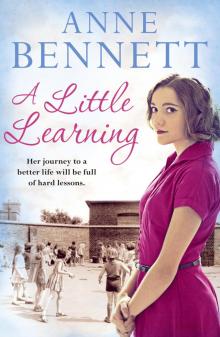 A Little Learning
A Little Learning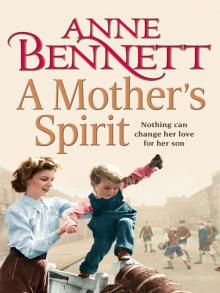 A Mother's Spirit
A Mother's Spirit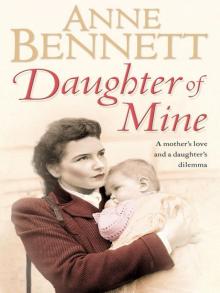 Daughter of Mine
Daughter of Mine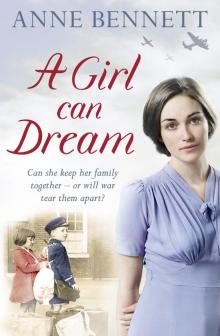 A Girl Can Dream
A Girl Can Dream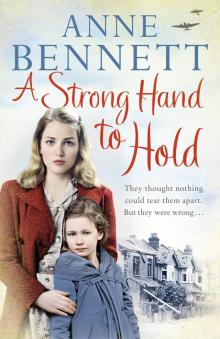 A Strong Hand to Hold
A Strong Hand to Hold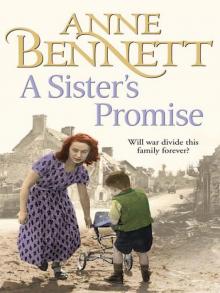 A Sister's Promise
A Sister's Promise To Have and to Hold
To Have and to Hold Pack Up Your Troubles
Pack Up Your Troubles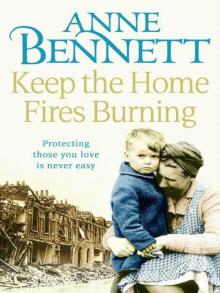 Keep the Home Fires Burning
Keep the Home Fires Burning Another Man's Child
Another Man's Child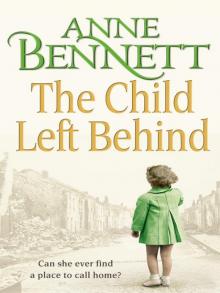 The Child Left Behind
The Child Left Behind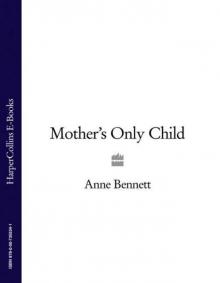 Mother’s Only Child
Mother’s Only Child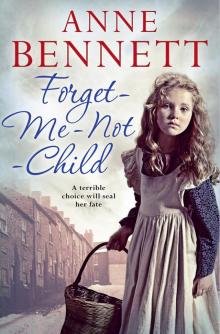 Forget-Me-Not Child
Forget-Me-Not Child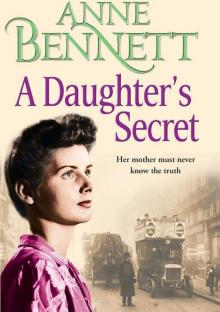 A Daughter's Secret
A Daughter's Secret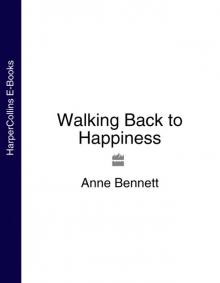 Walking Back to Happiness
Walking Back to Happiness Far From Home
Far From Home Till the Sun Shines Through
Till the Sun Shines Through